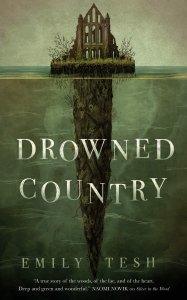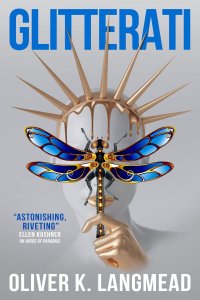Katharine Coldiron Reviews Drowned Country by Emily Tesh
 Drowned Country, Emily Tesh (Tor.com Publishing 978-1-25075-660-2, $13.99, 160pp, tp) August 2020.
Drowned Country, Emily Tesh (Tor.com Publishing 978-1-25075-660-2, $13.99, 160pp, tp) August 2020.
This time last year, I reviewed Emily Tesh’s debut novella, Silver in the Wood. It was an enchanting little book, full of love and darkness and the flutter of green leaves against one’s cheek. It can only be good news that this year we have a second Emily Tesh novella, continuing the story of Silver in the Wood a few years down the road. It’s difficult to find fault with her work, and equally difficult to explain the plot of either book well enough to make sense of it without diluting the pleasure of reading it. If you’d like, you may rest assured that Drowned Country is almost as wonderful as Silver in the Wood, and stop reading here (spoilers below).
This novella is darker and more complicated, less streamlined and stranger. Henry Silver narrates, and, despite taking on the supernatural role that Tobias Finch held in the prior book, he is the same impetuous, self-important idiot he was before. The love affair between Tobias and Henry lasted only a short while before Henry ruined it with deceit, and now they must go awkwardly on a quest together, with a hilariously blue-stockinged companion named Maud Lindhurst. “Silver was largely immune to the charms of young ladies in any case, but he did not think he had ever seen one less interested in being charming.” Maud is determined to visit Fairyland, which, in Tesh’s world, is a real place. Henry can get her there because of his powers related to the Wood – the book implies that the Wood is a vast kingdom that at one time or another will cover, or has covered, the whole world. They all go to Fairyland together, and they meet the terrifying Fairy Queen, who nearly destroys them. But they defeat her (temporarily), Tobias and Henry reconcile, and they find a new creature to do what Tobias did for so many years, and Henry did for so few.
That’s the shape of Drowned Country, but, of course, Tesh has told a far more bewitching tale than this summary indicates. The book opens with a mini-adventure to find a centuries-old vampire, whom Maud has rather handily defeated, and the story goes in a far different direction than expected. Henry’s tenure in his new position has been something of a disaster, as his personality is just too effervescent for the gravity of the job: “What frightened him more was his suspicion that he would go on growing older and stranger every year that passed. The mask of Henry Silver would fall further and further away with the centuries, and maybe he would forget his beautiful house with its beautiful library and end up wandering enchanted eternally in his wood.” Thus far, he has only succeeded in neglecting his mother and ruining his house with green growth.
Tesh has traded the linear narrative of Silver in the Wood for a more contemplative mood, seesawing back and forth between the present and the past to illustrate Henry’s internal conflicts. Her concerns are spread across a small handful of storylines (Maud, the quest, the breakup, Henry’s role in the Wood) rather than two main threads. The Fairy Queen and her realm are darker and bleaker than the foes Tobias went up against in Silver in the Wood, a fact which tips the book away from fancy and toward fright. Tesh describes black monoliths scattered across the waste of Fairyland, marked with “looming unpleasantness,” and implies that each of them is a living creature who was overtaken by the landscape and transformed into stone. The Fairy Queen herself resembles no one so much as Evil Galadriel, saying in all caps, “I WANT THE WORLD. I WANT SERVANTS TO COME CRAWLING TO MY FEET.”
This tone is markedly different than the slow-blooming romance underlying Silver in the Wood, and Tesh has more to juggle in Drowned Country, which might be why this book is a little less appealing than its predecessor. But that’s like saying one kind of Lindt truffle is a little less appealing than another. Tesh’s imagination is delectable, and her work here is captivating. I can only hope that she’ll continue putting out novellas every year around this time, so I can praise her as often as she deserves.
Katharine Coldiron is the author of Ceremonials (Kernpunkt Press), an SPD fiction bestseller. Her work as a book critic has appeared in The Washington Post, The Believer, The Guardian, and many other places. She lives in California and at kcoldiron.com.
This review and more like it in the September 2020 issue of Locus.
 While you are here, please take a moment to support Locus with a one-time or recurring donation. We rely on reader donations to keep the magazine and site going, and would like to keep the site paywall free, but WE NEED YOUR FINANCIAL SUPPORT to continue quality coverage of the science fiction and fantasy field.
While you are here, please take a moment to support Locus with a one-time or recurring donation. We rely on reader donations to keep the magazine and site going, and would like to keep the site paywall free, but WE NEED YOUR FINANCIAL SUPPORT to continue quality coverage of the science fiction and fantasy field.
©Locus Magazine. Copyrighted material may not be republished without permission of LSFF.





